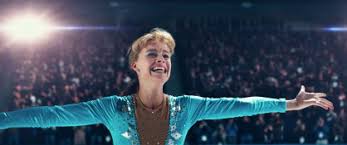
“I, Tonya” starts with a title card telling us it’s “Based on irony-free, wildly contradictory and totally true interviews with Tonya Harding and Jeff Gillooly.” I wasn’t sure what to make of that — is this going to be a drama or a comedy or a mix of the two? Call it a dark comedy, if you like.
It seems to be leaning in the comedy direction, but there’s no humor in the tale of a woman who was physically and emotionally abused from childhood by her mother and into adulthood by her husband. That’s why the 1993 Tina Turner biopic, “What’s Love Got To Do With It” didn’t present itself as a comedy. As horrific as some of those scenes are in “I, Tonya,” a few of them are presented in a not-so-serious way. That bothered me.
The movie is fashioned as if it’s almost a mockumentary, with many of the characters telling their versions of Tonya’s life story in interviews. Other times, as we see the scenes they’re describing played out, the characters break the fourth wall and look straight into the camera as they continue their narration. That lightens the tone of the movie unnecessarily.
“I, Tonya” plays as though she’s a victim of every circumstance in her sordid life, but — like “The Florida Project” — this is a movie about bad people making bad choices. Tonya may have been a helluva skater, but she was also the kind of genius who alternated drags of a cigarette with hits from her asthma inhaler. She takes no responsibility for the problems that befall her, placing blame instead on her poor upbringing, her horrible mother, her scumbag husband, and the figure skating judges.
As for the cast, Margot Robbie is nothing short of great as Tonya. She gets the look, the attitude, and the swagger just right. I don’t know how much of the skating she really did, but it’s hard to tell when it’s a double doing those triple-axels instead of Robbie. Allison Janney also does a very convincing job as LaVona, Tonya’s mother, who is in the running for Worst Parent Ever. She’ll probably be nominated for an Oscar and give Laurie Metcalf (the mother in “Lady Bird”) a run for her money. It’s nice to see McKenna Grace (who I enjoyed so much last year in “Gifted“) onscreen again as young Tonya. There are also solid performances by Sebastian Stan as the slimy Gillooly (is that redundant?) and Julianne Nicholson as Tonya’s skating coach.
Director Craig Gillespie’s previous movie, “Their Finest Hours,” was on my Worst Movies Of 2016 list. This time around, he does a better job with the action sequences — the skating scenes look very authentic — but gets so much of the rest of it wrong. For example, he fills the soundtrack with tons of songs right out of the Martin Scorcese playbook, but some of them are poorly placed chronologically (e.g. why do we hear Chicago’s 1971 tune “25 or 6 to 4” in a scene that takes place in 1993?). It’s as if he had put his Spotify classic rock playlist on shuffle and added the results randomly. He evens includes the umpteenth use of Norman Greenbaum’s “Spirit In The Sky,” which should be retired from films forever.
One thing Gillespie and his crew got 100% right was the look of those characters and the era. You can compare his fictionalized versions with the real Tonya (on ice) — as well as the idiots who surrounded her — in archival footage during the closing credits.
Of course, the only reason the movie exists, the only reason we even know Tonya Harding’s name, is because of The Incident. That was the 1994 attack on her rival, Nancy Kerrigan, at the US Figure Skating Championships in Detroit by Shane Standt, one of the lunkheads employed by Shawn Eckhardt, best friend of Tonya’s husband Jeff Gillooly. These lowlifes are portrayed for comedic effect as pure dunces, another odd choice considering the violence against an innocent woman.
I remember much of the real story because, in those days, I talked about every detail of it on my radio show, and was even in the arena at the 1992 Olympics in Albertville, France, when Tonya, Nancy, Kristi Yamaguchi, Midori Ito, Surya Bonaly and others competed (I was there for a weeklong remote broadcast of my WCXR/Washington morning show). On several occasions, I discussed the story with USA Today sports columnist Christine Brennan, who covered the other top figure skaters of that era and wrote the definitive book about them. In a recent column about “I, Tonya,” Christine was similarly disappointed with the movie:
For a quarter of a century now, popular culture has somehow fallen for the notion that Tonya got a raw deal from figure skating judges and the U.S. Figure Skating Association. This is the oxygen on which I, Tonya survives: Poor Tonya. The bad girl from the wrong side of the tracks got the shaft at every turn.
Nice try, but no. U.S. officials didn’t send Tonya to one Olympics. They sent her to two. She also won two U.S. national titles, one of which was later taken away due to her supporting role in the attack on Kerrigan. (She gave information about Nancy’s Cape Cod training rink to the “hit men,” and later pled guilty to the felony of conspiracy to hinder the prosecution.)
Because of the attack on Nancy, Tonya’s name stayed in the headlines for several months in 1994, until she was replaced by another athlete up to no good — OJ Simpson, who sucked up every minute of our attention for months to follow. At least the recent movies about him didn’t play the victim card, as “I, Tonya” unfortunately does.
I give “I, Tonya” a 5 out of 10.
